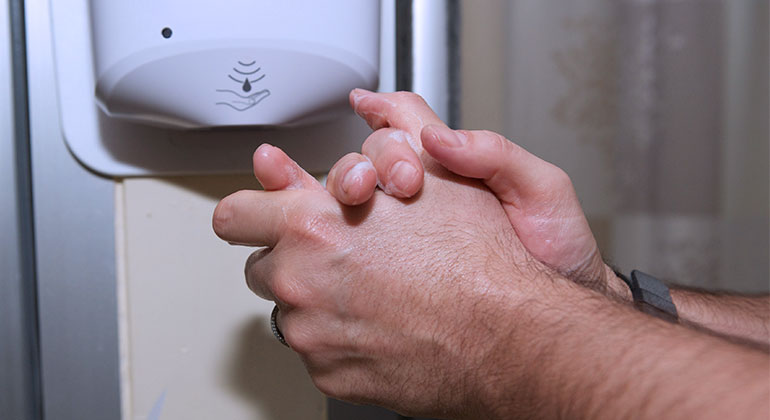Infection Prevention and Control

When it comes to preventing infections, we all have a part to play. In fact, there’s a slogan throughout health care in the United States: “Infection Prevention is Everyone’s Business.” At Mount Sinai, we are committed to keeping patients safe while under our care. But we can’t do it without you—whether you’re a patient, a family member, or visiting friend.
Due to COVID-19, many of our hospital policies regarding infection prevention and management change frequently. Click here to review our latest policies and procedures for patients, visitors and families.
You Do Your Part, We’ll Do Ours
From hospital administration to physicians to the nurses on every floor, infection prevention is an essential part of our daily workflow. At Mount Sinai, we have cultivated a mindset and culture that puts infection prevention front and center. As a visitor or a patient, you may see posters in the hallways that remind us of guidelines or procedures. But you won’t see the daily huddles, the onscreen reminders, or the management meetings that monitor and work to prevent the occurrence of infections.
And that’s as it should be. But while we’re working behind the scenes, here’s what we would like you to do:
Practice Hand Hygiene
Handwashing is our first line of defense against infection. Wash your hands after using restrooms, after sneezing, or blowing your nose. If you’re visiting a patient, use hand sanitizer before entering the room. What goes for patients and visitors, goes double for our staff. You will see them using hand sanitizer when entering and leaving the room. And any task that involves a patient will involve hand sanitization, as well.
If You’re Sick, Don’t Visit
We know it’s important to visit and offer emotional support to loved ones in the hospital. But if you have a cold or flu-like symptoms, you may do more harm than good. Other patients may be in even weaker condition than your loved one, and just passing in the hallway or touching a doorknob may put them at risk. So stay home—and call instead—if you have a cold.
Trust Our Doctors to Prescribe Antibiotics When Needed
If a doctor doesn’t prescribe antibiotics, there’s a good reason for it. Viruses don’t respond to antibiotics, and prescribing antibiotics when they’re not called for reduces their effectiveness when needed. So if you feel your symptoms warrant antibiotics, and the doctor doesn’t prescribe them—trust his or her judgement. That way, when you really need antibiotics, they’ll work for you.
Leaders in Infection Prevention and Control
Mount Sinai physicians and researchers are constantly seeking to improve the way we prevent and control infections in our hospitals and other facilities. The Infection Prevention Program establishes guidelines throughout the Mount Sinai Health System to prevent the spread of bacteria, viruses, and fungi that can cause infection. We work with all departments and disciplines—from doctors to nurses to administrators—to develop effective monitoring systems and protocols for infection prevention and control.
We also conduct research through the Division of Infectious Diseases at the Icahn School of Medicine at Mount Sinai to develop innovative methods of disinfection, disease containment and prevention, and safer medical and surgical procedures. In addition, we study infectious diseases that are of concern here in New York, such as Candida auris, a novel fungal infection.
Between our experts in Infectious Diseases and Infection Prevention and Control and your efforts, we can continue to make the Mount Sinai Health System an exceptional place for healing. We also take many other steps to keep you safe—from cybersecurity to frequent “rounding” or check-ins with patients. Find out more.
Patient Information
The team from Infection Prevention and Control has put together a number of helpful brochures for common healthcare-associated diseases. Learn more about your care in the hospital and after you’re discharged.
Download information on Clostridioides difficile (C. diff)
Download information on Carbapenem-resistant Enterobacteriaceae (CRE)
Download information on resistant Staph infections
Download information on Central Line-Associated Bloodstream Infections (CLABSI)
Download information on Catheter-Associated Urinary Tract Infections (CAUTI)